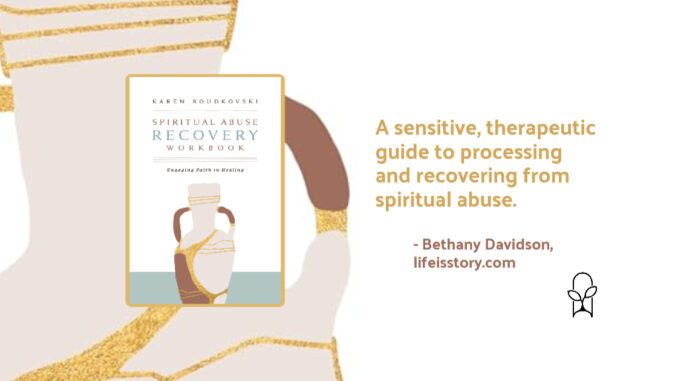
Also by this author: Understanding Spiritual Abuse: What It Is and How to Respond, Counseling Through the Storm: A Guide to Treating Crisis and Trauma
Published by B&H Publishing, B&H Academic on April 15, 2025
Genres: Academic, Non-Fiction, Christian Life
Buy on Amazon
Goodreads

Recovering from spiritual abuse can be a difficult journey—but you don’t have to do it alone.
In Spiritual Abuse Recovery Workbook: Engaging Faith in Healing, Licensed Professional Counselor Karen Roudkovski offers practical therapeutic tools for recovery from a trauma-informed perspective, while incorporating faith and Scripture in a sensitive and caring manner.
Designed for use in therapy settings, support groups, or personal study, Spiritual Abuse Recovery Workbook guides survivors of spiritual abuse through 12 weeks of exercises and reflections to help them understand and process their experiences and begin the journey of healing. Each chapter provides a brief overview of the goals for the week, daily exercises and opportunities for reflection, space for journaling, and sensitive explorations of Christian Scripture.
The exercises are built from the research Roudkovski conducted for her book, Understanding Spiritual Abuse, to which this workbook is a companion. Spiritual Abuse Recovery Workbook includes the Spiritual Abuse Assessment in the first chapter so that survivors can take stock of their experience at the beginning of their healing journey. The appendix of this workbook includes additional resources and a leader’s guide for those leading a support group.
For survivors of spiritual abuse, the journey of recovery can feel unclear and treacherous. Through Spiritual Abuse Recovery Workbook, Karen Roudkovski provides a clear path forward through therapeutic practices and a grounded belief in God’s faithful goodness to his people.
Last year, I reviewed Understanding Spiritual Abuse by Karen Roudkovski. This new book is a companion workbook for survivors to use as part of their healing journeys. The author wrote this for people who have experienced spiritual abuse, and for people who are questioning whether or not that form of abuse is part of their story. Throughout this book, the author shares insights into what spiritual abuse is and what it looks like, and she explores ways that survivors can pursue help and healing, both through guided exercises here and through outside therapeutic interventions. She also explores what healing can look like for people who struggle with their faith as a result of their spiritual trauma.
The Spiritual Abuse Recovery Workbook follows a twelve-week structure that involves reading and exercises for six days, and encouragement to rest and do something enjoyable on the seventh day. The workbook exercises include surveys, open-ended reflection questions, embodied grounding practices, reflections on your spiritual history, and practices for reframing thoughts and changing unhealthy thinking patterns. The author also mentions which chapters of the original book relate to each week in this workbook, for people who want to use them in tandem. This workbook is also usable as a standalone.
People can use this workbook independently or in a group setting. In the appendix, Roudkovski shares advice for people who are leading groups through this material, and she offers outlines that group leaders can follow for each week’s gathering. I appreciate how broadly useful this book is for survivors, whether they are using this resource on their own, going through it with friends, or using it in therapy or in a formal support group.
This book primarily addresses more extreme cases of spiritual abuse, in which the victim has experienced trauma in a high-control environment that functions similarly to a cult. For example, this book references situations where an abuser dictates what the victim can and cannot do in their personal life. People who have experienced that kind of extreme, far-reaching control will benefit the most from this book. Readers who have suffered far less than this can fill out the specifics of their experience in response to the workbook’s questions, but parts of the book won’t apply to them.
There are lots of ways that leaders can subtly manipulate someone to get what they want, without exhibiting the kind of standard tactics that appear on checklists in books like this. For example, this book talks about pastors misusing Scripture to oppress their victims, but a pastor may instead use secular psychological resources to manipulate the situation, trying to confuse or silence the victim with something unfamiliar. That is more likely to fly under the radar than misusing Scripture. People who have suffered from more subtle, covert forms of abuse can greatly benefit from this book, but they’ll need to resist the temptation to downplay and minimize their experience just because they can’t mark as many things off on a checklist.
Spiritual Abuse Recovery Workbook: Engaging Faith in Healing is a sensitive, helpful guide to processing and healing from spiritually abusive situations. The author’s care and compassion come through clearly in her writing, and this book is full of wisdom and practical exercises that can help people deal with emotional dysregulation, heal from trauma, and grow in healthy spirituality. This book will be most helpful for victims of egregious, extreme forms of spiritual abuse, since most of the examples are geared towards them, but people who have suffered from more subtle forms of abuse can apply the same core principles in their healing journeys as well.
